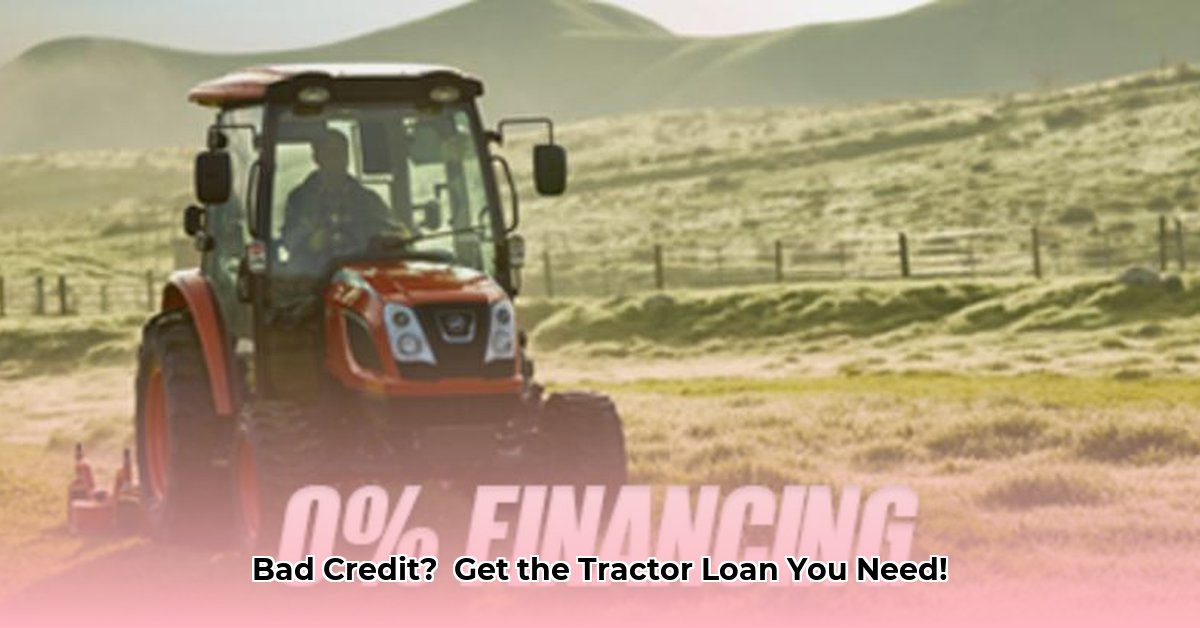
Getting a tractor loan can be tough, especially with less-than-perfect credit. But don't give up on your farming dreams! This guide provides practical steps to help you secure the financing you need, even with bad credit. We'll cover everything from understanding your credit score to negotiating the best loan terms. Let's get started!
Understanding Your Credit Score: The Key to Loan Approval
Your credit score is a number lenders use to assess your creditworthiness. A higher score means lower interest rates and easier loan approval. A lower score doesn't mean you're shut out, but it will likely mean higher interest rates and a more challenging application process. Knowing your score is the first step to getting the best loan terms. You can get your free credit report annually from [link to credit report website]. Don't ignore a low score, use it as motivation to improve it!
Exploring Your Tractor Financing Options: Finding the Right Fit
Several options exist for financing a tractor, even with bad credit. Let's examine the pros and cons of each:
1. Dealer Financing: Convenience at a Cost
Many tractor dealers offer in-house financing. This is convenient, but interest rates tend to be higher than other options, particularly for those with bad credit.
- Pros: Simple application process; one-stop shopping.
- Cons: Potentially higher interest rates.
2. USDA Loans: Government Support for Farmers
The USDA offers various loan programs designed to support farmers. While they often have lower interest rates, approval times can be longer, and eligibility requirements are strict. Consider USDA loans to access potentially more favorable terms. Several USDA programs explicitly target sustainable agriculture initiatives.
- Pros: Potentially lower interest rates; government backing.
- Cons: Lengthy application process; stringent eligibility.
3. Personal Loans: A Flexible Alternative
Banks and credit unions offer personal loans that can be used to purchase equipment. Interest rates vary widely depending on your credit score. While interest rates may be substantial for bad credit, personal loans offer flexibility and less regulatory overhead than USDA loans.
- Pros: Relatively easy to obtain; flexible repayment plans (often).
- Cons: Higher interest rates for bad credit; may not be specifically designed for agricultural equipment.
4. Online Lending Platforms: Speed and Convenience
Several online platforms specialize in loans for those with less-than-perfect credit. While convenient for speed, be cautious. Interest rates and fees can be high. Always thoroughly research any online lender before applying to avoid potentially predatory loans.
- Pros: Quick application and decision; convenient online access.
- Cons: Potentially very high interest rates; hidden fees.
Improving Your Credit Score: A Long-Term Investment
A higher credit score opens doors to better loan terms. Even small improvements can make a big difference. Consider these steps:
- Pay Bills on Time: This is the most critical factor influencing your credit score.
- Reduce Credit Utilization: Keep your credit card balances below 30% of your credit limit.
- Monitor Your Credit Report: Regularly check for errors and dispute any inaccuracies.
- Consider a Secured Credit Card: This can help build credit if you have trouble getting approved for a regular card.
Negotiating Loan Terms: Getting the Best Deal
Don't simply accept the first loan offer. Here's how to negotiate:
- Shop Around: Get quotes from multiple lenders to compare rates and terms.
- Negotiate Interest Rates: Even a small reduction in interest can save you a substantial amount over the life of the loan.
- Explore Repayment Options: Discuss longer or shorter repayment terms to find what best suits your budget.
- Present a Solid Farming Plan: Demonstrate your understanding of the finances and your repayment capacity.
Understanding the Total Cost: A Realistic Budget
Don't just focus on the purchase price! Account for these additional costs:
- Interest: The total interest paid over the loan term.
- Insurance: Protecting your investment is vital.
- Maintenance: Regular upkeep and potential repairs.
- Depreciation: The tractor's value will decline over time.
A detailed budget will help you make an informed decision and avoid financial surprises later. Planning for these additional costs is critical to sustainable farm operations. The lower operating costs of fuel-efficient tractors should figure substantially in your budget.
Conclusion: Take Action Today
Securing a tractor loan with bad credit may seem daunting, but it's achievable. By understanding your options, improving your credit, and negotiating effectively, you can get the financing you need to invest in your farming operation and ensure a thriving future. Start today!